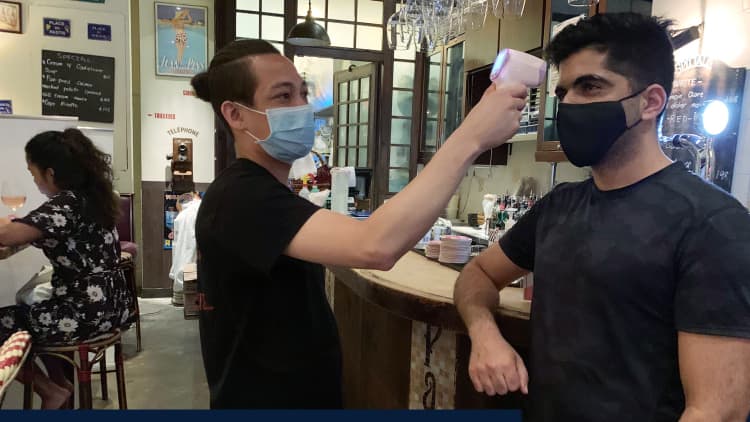Britain's National Health Service (NHS) has started rolling out an app that aims to track the spread of the coronavirus.
The app is initially being trialed by local government and health-care workers on the Isle of Wight, which is situated just off the south coast of England.
All of the Isle of Wight's 142,000 inhabitants will be able to download it from Thursday, while the wider U.K. population could get access within weeks.
"By downloading the app, you're protecting your own health, you're protecting the health of your loved ones and the health of your community," said British health minister Matt Hancock on Monday.
The app — designed to work alongside 18,000 human contact tracers and a significant testing regime — is a key part of the U.K. government's lockdown exit strategy, which has been branded "Test, Track and Trace."
The number of coronavirus-related deaths in the U.K. now stands at 32,313, according to calculations by Reuters based on numbers published by the Office for National Statistics.
The NHS app uses low-energy Bluetooth signals to track interactions with other people's phones and create a log of app users who have been in proximity to one another. It specifically records when people are within two meters of each other for more than 15 minutes.
When someone develops a fever, a cough, or both, they can inform the app, which will then alert recent contacts and advise them that they may be at risk of infection.

Multiple concerns
The government app could soon be able to determine where people go and who they see. As a result, privacy campaigners have raised concerns about "mission creep" and Britain walking into a surveillance state.
To make matter's worse, the NHS has shunned Apple and Google's "decentralized" framework in favor of a "centralized" approach, meaning data is processed on a central database instead of on the smartphone itself.
While the Apple-Google model protects people's privacy, it also limits how much data the authorities can see. If the NHS builds the app itself then it can access all the data and tweak the app as and when it sees fit.
The Information Commissioner's Office, which is the U.K. data regulator, said that "as a general rule, a decentralized approach" would be more in line with its principles.
Orla Lynskey, a law professor at the London School of Economics, told the U.K. government's human rights select committee on Monday: "There is an inherent risk that if you create a system that can be added to incrementally, you could do so in a way that is very privacy invasive."
But NHSX, the app's designer and the digital arm of the NHS, argues that privacy has been built into the voluntary app.
To begin with, the only personal data stored by the app will be the first part of the user's postcode. Users then have to opt-in if they wish to share additional location data.
"I can't give you a definitive list of exactly who would have access to the data," Matthew Gould, chief executive of NHSX, told Parliament on Monday.
"But what I can say is, we will have proper procedures in place consistent with law that will make sure that only those who have an appropriate public health reason for seeing the data do so, and they do so under very clear conditions and criteria."
There are big concerns that the app simply won't work as there is currently little evidence to show that contact-tracing apps are effective in slowing the spread of coronavirus.
The NHS solution could also be a power drain on people's phones, especially on older devices with limited battery life. That's because the app has to wake up in the background every time the phone recognizes another handset running the same app.
Oxford researchers found that contact-tracing apps will only work as they're intended to if around half the total population use the app.
Gould admitted that there will "inevitably be unintended consequences" during the launch period.
Over 53 contact-tracing apps have already been rolled out in 29 countries, according to VPN provider Top10VPN. For 15 of them, it isn't clear if they're centralized or decentralized. Of the remainder, 20 are centralized compared to only eight that are decentralized.

